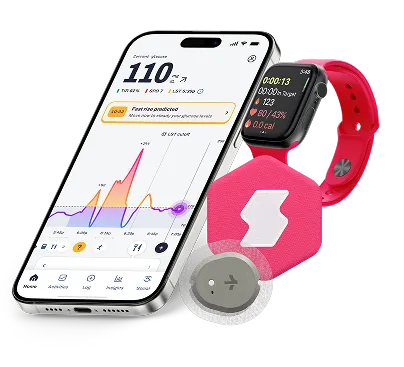Carrots, a root vegetable, have been cultivated for thousands of years and have been consumed worldwide due to versatility in cooking.
Due to their sweet taste, carrots are often said to be high in sugar and should be avoided entirely. However, when compared to other fruits and vegetables, the natural sugar content of carrots is not high.
This article will explore how carrots may impact blood sugar levels and the health benefits that could be gained from including this vegetable in meals.
Sign up to be the first to know about special offers and exciting Signos news.
Glycemic Index Table
Carrots have a low glycemic index, typically ranging between 16 and 41. Eating raw carrots results in a slower and more gradual increase in blood sugar compared to foods with a higher GI. The sugar in carrots is accompanied by fiber, which helps slow down the absorption of sugar into the bloodstream.1
The specific GI of carrots can vary depending on ripeness and how they are cooked. Cooked carrots generally have a higher GI compared to raw carrots. Boiled carrots have a higher GI than raw carrots. Steamed carrots have a slightly higher GI than raw carrots; however, they have a lower GI than boiled carrots.¹ ²
The below glycemic index and glycemic load data are for raw, mature carrots.³ ⁴

Nutritional Facts
Carrots are packed with essential vitamins and minerals. Specifically, they are an excellent natural source of beta-carotene, which helps maintain healthy vision, skin, and immune system functions. Carrots are also rich in fiber, vitamin K, vitamin C, potassium, and antioxidants.
The below nutritional information is for 100g of raw, mature carrots, which equates to approximately two small-to-medium carrots.⁴
Nutritional Facts

Is Carrot Good for Weight Loss?
As a low-calorie food, carrots can increase fullness and decrease calorie intake in subsequent meals.⁹ The fiber found in carrots will help reduce hunger by slowing down digestion, which will result in an individual feeling fuller for longer and reducing overeating.
Carrots also contain a powerhouse of vitamin A, with one cup of raw carrots offering 408% of the daily value of this nutrient. Some forms of vitamin A communicate with fat cells and influence fat cell growth, fat storage, and obesity.10 One study also found that vitamin A may play a role in reducing abdominal obesity, showing that carrots may help with weight loss goals.¹⁰
Is Carrot Safe for People Living with Diabetes?
When eaten in moderate amounts, carrots have minimal impact on blood sugar compared to high-GI foods. The fiber content in carrots slows down the digestion and absorption of carbohydrates, preventing blood sugar spikes.
People living with diabetes or those who want to keep their blood sugar stable should eat carrots in moderate portions or eat them as part of a balanced meal or snack. While carrots are generally considered suitable for those living with diabetes, eating too much at once may lead to high blood sugar.
Beta-carotene, a potent antioxidant found in carrots, may play a role in regulating glucose metabolism. Research on the relationship between beta-carotene and insulin resistance is still evolving. Still, some studies suggest that vitamin A deficiency may decrease insulin secretion and elevate blood glucose.⁷ ⁸ Beta-carotene converts to vitamin A in the body, so eating more carrots might help improve insulin resistance and type 2 diabetes.
The cooking method of carrots can also influence blood sugar levels. Raw carrots have a low glycemic index, which means they have minimal impact on blood sugar levels. This makes them a suitable choice for individuals living with diabetes, as they are less likely to cause significant fluctuations in blood sugar.
Boiling carrots may result in a higher glycemic index compared to other cooking methods due to increased water content. Steaming or microwaving carrots generally helps maintain their texture and fiber content, resulting in a lower glycemic index.
Better health starts here.
Sign up for tips and insights that work for you!
Allergies
Some individuals may experience allergies or sensitivities to carrots. While carrot allergies are rare, symptoms of an allergic reaction can include itching, tingling, or swelling of the lips, tongue, or throat, hives, sneezing, watery eyes, abdominal pain, and nausea. In more severe cases, symptoms can include anaphylaxis, which can be a life-threatening condition.
Some individuals who are allergic to raw carrots may be able to consume cooked carrots since allergenic proteins can be destroyed during the cooking process. This decreases the likelihood of an allergic reaction but can vary depending on the individual’s allergy.
If you suspect an allergy to carrots, please consult a healthcare professional.

References
References
- Atkinson, F. S., Foster-Powell, K., & Brand-Miller, J. C. (2008). International tables of glycemic index and glycemic load values: 2008. Diabetes Care, 31(12), 2281–2283. https://doi.org/10.2337/dc08-1239
- Sharma, K. D., Karki, S., Thakur, N. S., & Attri, S. (2012). Chemical composition, functional properties and processing of carrot-a review. Journal of Food Science and Technology, 49(1), 22–32. https://doi.org/10.1007/s13197-011-0310-7
- The University of Sydney. (2023, May 1). Glycemic Index – Glycemic Index Research and GI News. https://glycemicindex.com/
- USDA FoodData Central. (2022, April 28). Food Details - Carrots, mature, raw. Retrieved from https://fdc.nal.usda.gov/fdc-app.html#/food-details/2258586/nutrients
- Zhang, Y., Wang, T., Hu, X., & Chen, G. (2021). Vitamin A and Diabetes. Journal of Medicinal Food, 24(8), 775–785. https://doi.org/10.1089/jmf.2020.0147
- Nix, W. A., Zirwes, R., Bangert, V., Kaiser, R. P., Schilling, M., Hostalek, U., & Obeid, R. (2015). Vitamin B status in patients with type 2 diabetes mellitus with and without incipient nephropathy. Diabetes Research and Clinical Practice, 107(1), 157–165. https://doi.org/10.1016/j.diabres.2014.09.058
- Trasino, S. E., Benoit, Y. D., & Gudas, L. J. (2015). Vitamin A deficiency causes hyperglycemia and loss of pancreatic β-cell mass. The Journal of Biological Chemistry, 290(3), 1456–1473. https://doi.org/10.1074/jbc.M114.616763
- Marcelino, G., Machate, D. J., Freitas, K. C., Hiane, P. A., Maldonade, I. R., Pott, A., Asato, M. A., Candido, C. J., & Guimarães, R. C. A. (2020). β-Carotene: Preventive Role for Type 2 Diabetes Mellitus and Obesity: A Review. Molecules (Basel, Switzerland), 25(24), 5803. https://doi.org/10.3390/molecules25245803
- Anne Moorhead S, Welch RW, Barbara M, Livingstone E, McCourt M, Burns AA, Dunne A. The effects of the fibre content and physical structure of carrots on satiety and subsequent intakes when eaten as part of a mixed meal. British Journal of Nutrition. 2006 Sep;96(3):587-95. doi: 10.1079/bjn20061790. PMID: 16925866.
- Bonet ML, Canas JA, Ribot J, Palou A. Carotenoids and their conversion products in the control of adipocyte function, adiposity and obesity. Archives of Biochemistry and Biophysics. 2015 Apr 15;572:112-125. doi: 10.1016/j.abb.2015.02.022. Epub 2015 Feb 23. PMID: 25721497.




.svg)
.svg)
.svg)
.svg)
.svg)
.svg)
.svg)
.svg)
